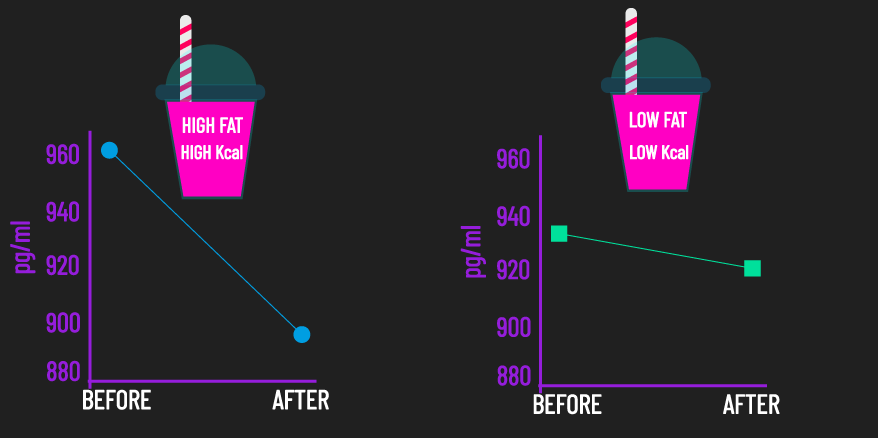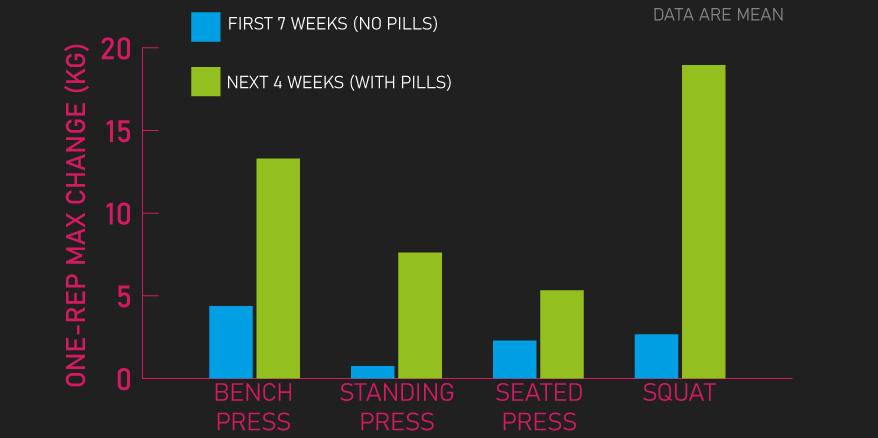
When consuming fitness content online, including mine, much of the discussion is on training variables and nutrition.
How many sets or reps? What training split? and so on and so forth.
Of course, this is for good reason. Training and nutrition are absolutely important for strength and muscle development.
Yet, there’s one factor I wanted to discuss away from training and nutrition that might play a crucial role in your adaptations.
This is your mind, where your thoughts, assumptions, and beliefs reside.
Rest assured I’m not going to throw a bunch of motivational quotes to you, but what we’ll do is evaluate some underappreciated research demonstrating how powerful mindsets may be for influencing your physiology, and this includes your adaptations in response to training.
Part I: Your Mind Influences Your Physiology
The idea that the mind can impact your body isn’t new, and chances are you have your own experiences with this.
For example, when you’re feeling anxious or nervous about something, your heart rate increases and/or you may feel butterflies in your stomach.
However, our mindstates might also have effects in areas we do not readily expect.
A fascinating study by Crum and Corbin demonstrates how your mindset about what you nutritionally consume may influence its physiological impact.
46 individuals were recruited.
On two different days, the participants drank a milkshake.
On one day, they drank an “indulgent” milkshake that was labeled as high in fat and calories.
On the other day, they drank a “sensible” milkshake that was labeled as low in fat and calories.
Now, before drinking the milkshake in both situations, the subjects read the nutritional label and as you’d expect, they rated the “sensible” milkshake as healthier.
After consuming the milkshake, the response of ghrelin was measured. Ghrelin is a hormone that is elevated when energy intake is low to signal the brain to produce the sensation of hunger and thus motivate you to consume food. After you’ve consumed sufficient food, ghrelin is suppressed so you feel satisfied and no longer hungry.
It was found ghrelin sharply decreased after consuming the “indulgent” high-fat high calorie milkshake, but it minimally changed after consuming the “sensible” low-fat low calorie milkshake.

This is what you’d expect, a high-fat high-calorie milkshake should suppress ghrelin way more than a low-fat low-calorie milkshake.
But guess what?
The milkshakes consumed on both days were exactly the same.
The subjects were misled into thinking the two milkshakes were different through the fake labels displayed to them.
These findings are highly interesting, they indicate despite the milkshake being exactly the same, consuming with the mindset it’s high-fat high calories suppresses the post ghrelin response, whereas consuming it with the mindset it’s low fat low calories minimally impacts ghrelin response.
Some of you may be thinking sure, these findings are super interesting, but how do they apply to developing muscle and strength?
Let’s find out.
Part II: Your Mind Influences Your Gains
What if we could trick someone into thinking they’re taking anabolic steroids when in reality they’re not?
Would the mere belief their taking anabolic steroids be enough to significantly increase their rate of adaptations?
Or does the fact they’re not actually taking anabolic steroids mean their rate of adaptations remains the same?
These are interesting questions, and if we travel back to 1973, two researchers by the name of Ariel and Saville aimed to answer them.
15 male varsity athletes (with at least 2 years of weight training experience) first trained for 7 weeks. During this period, those that made the largest gains in one-rep max strength on the bench press, seated press, standing press, and squat, would be rewarded with free access to steroids to use during a subsequent 4 week training period.
As the researchers promised, 6 subjects (of the initial 15) were selected to train for a further 4 weeks, while given a 10mg pill of Dianabol, an anabolic steroid, to take daily. However, the subjects were the pill they took was a placebo pill, it was not actually Dianabol.
The results were truly surprising.
After the initial 7 training weeks, where the 6 subjects were not taking any placebo pill, their one-rep maxes increased by an average of 4.35kg for the bench press, 0.73kg for the standing press, 2.27kg for the seated press, and 2.65kg for the squat.
But after the 4 weeks in which the subjects took the daily placebo pills, their one-rep maxes increased by an average of 13.28kg on the bench press, 7.58kg on the standing press, 5.3kg on the seated press, and 18.94kg on the squat.

Thus, the subjects experienced between 2-10X more strength gains in just over half the time, simply by being misled into thinking they were on anabolic steroids, even though they were merely consuming placebo pills.
Another study by Maganaris et al., conducted in 2000, provides us with no less of a surprising insight into the power of the placebo.
The lead author of the study was a powerlifting coach. Previously, his athletes (precisely 11 nationally ranked powerlifters) had asked the coach about the effectiveness of anabolic steroids, which inspired the coach to conduct this study.
First, the researchers assessed the subject’s baseline one-rep maxes on the bench press, squat, and deadlift.
Note, their average one-rep maxes were 189kg for the bench press, 257kg for the squat, and 260kg for the deadlift, so there were pretty damn strong.
In the first experimental session, 5 minutes before testing one-rep max on the bench press, squat, and deadlift, the subjects were given two tablets and told they were immediate-acting anabolic steroids. However, the pills were simply placebo.
After taking these two pills, all subjects hit personal records. The subject’s one-rep maxes were an average 9.5kg higher on the bench press, 12.2kg higher on the squat, and 10.9kg higher on the deadlift versus baseline.
Fascinatingly, the authors noted these performance increases represented a change from being nationally ranked, to being internationally ranked for all subjects.
Put another way, simply thinking they took immediate-acting anabolic steroids instantly elevated the subject’s strength abilities to seriously impressive levels.
After this first experimental session, all subjects were provided with two more placebo pills to use during their upcoming training week. During this week, all subjects reported increased vigor and that they were lifting heavier loads or performing more repetitions than ever before.
In the second experimental session, after the week of training, one-rep max on the bench press, squat, and deadlift was measured yet again.
However, before the one-rep max test, some subjects were actually told the pills they took were merely a placebo.
These subjects, compared to the first experiment session, lifted 7.5kg less on the bench press, 11kg less on the squat, and 12.5kg less on the deadlift.
In other words, despite them performing better than ever before in the first experimental session and the training week, the simple revelation they had only been consuming a placebo all along plummeted their strength back down to near baseline.
The other subjects who remained unaware the pills they were taking were placebos, did not really make any further gains on average, but roughly maintained the impressive gains they experienced compared to the baseline values.
Before moving on, if you’re curious about creating an effective training program for muscle hypertrophy, our high quality partner Alpha Progression can help. It can generate a highly effective program for you, track your workouts live with in-built progression recommendations, provide graphs displaying your long term progress, and it has a massive exercise database with more than 550 exercises.
Click HERE (the link opens in a new tab) to get a free 2 week trial of the apps features. If you like it and go beyond, the link also gives you 20% off a subscription!
We never promote trash at the House of Hypertrophy, so rest assured the app is high quality. The reviews speak to this, 4.8 starts (based on more than 7,000 reviews) on Google play, and 4.9 stars in Apple’s store (based on nearly 400 ratings).
Part III: Concluding Thoughts
The findings of the two papers overviewed are truly fascinating and demonstrate how your mindset (or the belief you taking anabolics) can powerfully influence strength.
It’s unfortunate neither study looked at muscle growth but given we’ve seen mindsets interact with physiology, it’s very possible muscle growth is similarly impacted. It would be awesome if future research can examine this.
Now, how can you use the findings of the research we’ve overviewed to help yourself?
Needless to say, it’s going to be pretty much impossible to truly trick and convince yourself you’re taking anabolic steroids. I’m not sure you’re going to be able to truly convince yourself your daily vitamin D table is actually an anabolic steroid.
However, now that you’re aware of this research, the most practical takeaway is probably that you’d just want to be mindful of your thoughts, assumptions, and expectations.
If you’re someone who constantly says you have bad strength or muscle-building capacities, it’s probably best for you to try to change this and try to adopt a more optimistic mindset. For example, you may wish to try and establish the mindset you have better abilities than you once thought.
After all, remember that in the Ariel Saville and Magnaris studies, the impressive strength increases didn’t come from anabolic steroids (they were only taking placebo pills), thus the impressive strength gains came from the individuals themselves, they had that ability within themselves.
Of course, mindstate’s apply to anything, not just lifting weights. Just maybe, we’re capable of a lot more than we believe.
Remember to feel free to check out the Alpha Progression App if you’re interested. Also feel free to check out our free bench press e-book below.

